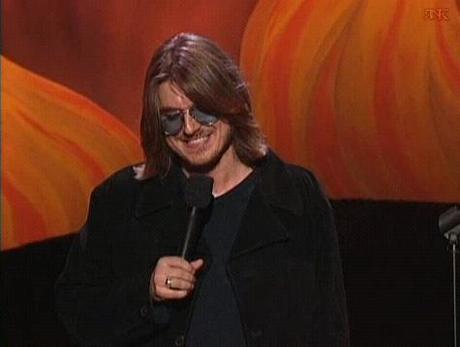
A counterfactual is a statement about a cause and effect relationship, but in regards to a cause and effect that did not actually happen. A counterfactual statement is something like, if I had not bought a condo in 2007 I would not be underwater in my mortgage debt now in 2011. Steven Sloman (24) argues that notions of causation, such as my being hungry because I skipped lunch, imply certain counterfactuals, such that I would not have been hungry had I not skipped lunch. Jaegwon Kim (205) has pointed out that counterfactuals can also exist where there are no causal relationships. For example, if it were not 2011 this year it would not have been 2010 last year, is a counterfactual statement, but does imply that 2010 caused 2011. Since its April Fool’s Day I thought it would be fun to think talk about counterfactuals with a comedic slant.
My favorite stand-up comedian of all time is the late Mitch Hedberg, who unfortunately passed away far too young. I was lucky enough to be in the crowd for Hedberg’s stand up act several times, and I don’t think I have ever laughed as hard in my life, even when he would say I joke I already heard several times before. The last time I saw Hedberg perform I was with my friends Mike, Michelle, and Kevin, and after the comedy was done we made our way backstage to introduce ourselves and thanked Mitch for a great show. We ended up talking with him for a while and invited him back to our apartment when he was done with his last act. He accepted, wrote down one of our phone numbers, and even gave us $20 for beer, but alas he never called us later that night to hang out.
If only Mitch had shown up to my apartment to hang out with me and my friends…this is the Mitch Hedberg Counterfactual. Any number of things could have occurred given this change in circumstances, and I think this makes the notion of a counterfactual very tricky and fun. Since there are too many possible causal chains in the Mitch Hedberg Counterfactual, and being that I never got to really hang out with Mitch and thus know nothing about what he would really be like in person, I will have to contrive my own scenarios. To do this I will present a possible scenario based around three of my favorite Hedberg jokes that involve counterfactuals of their own.
After Mitch, my friends, and I arrived at the apartment, one of my friends pointed out to him that he was blocking our fire exit, and he said, “As though if there was a fire, I wasn’t gonna run. If you’re flammable and you have legs, you are never blocking a fire exit.”
After that we went down to the market to get some more beer and some snacks. Mitch just bought a doughnut, and when the cashier handed him a receipt he said, “I don’t need a receipt for the doughnut. I’ll just give you the money, and you give me the doughnut… end of transaction. We don’t need to bring ink and paper into this. I just can’t imagine a scenario where I would have to prove that I bought a doughnut. Some skeptical friend: ‘Don’t even act like I didn’t get that doughnut! I got the documentation right here… oh, wait it’s at home… in the file… under ‘D’… for doughnut.”
As we were wrapping up the night and saying our goodbyes, I was handing Mitch his jacket and he said, “This [jacket] is dry-clean only, which means its dirty.”
Hedberg’s jokes about the fire exit and the doughnut receipt involve a counterfactual that helps to make them funny. The dry-clean only joke only implies a counterfactual, because Mitch is leaves unstated the corollary that his shirt would be clean if it was not dry-clean only. It just goes to show that we humans like to laugh about that never happened as well as things that did.
Jared Roy Endicott

Works Cited
Kim, Jaegwon. “Causes and Counterfactuals.” Causation (Oxford Readings in Philosophy). Eds. Ernest Sosa and Michael Tooley. New York: Oxford University Press, 1993. 205-207. Print.
Sloman, Steven. Causal Models: How People Think About the World and Its Alternatives. New York: Oxford University Press, 2005. Print.

